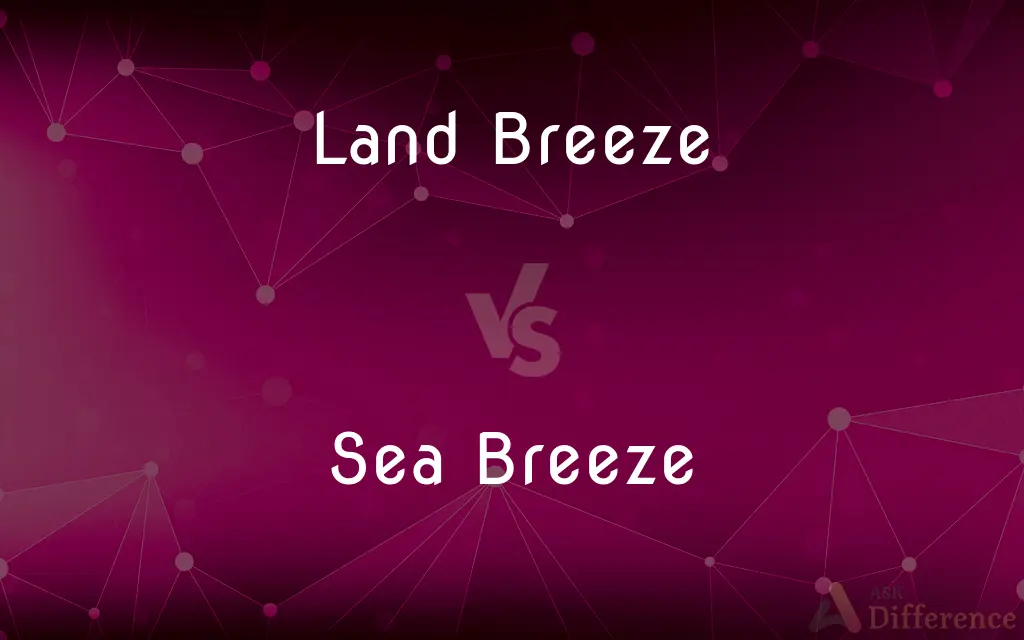Land Breeze vs. Sea Breeze — What's the Difference?
By Tayyaba Rehman — Published on November 1, 2023
Land Breeze blows from land to sea during nighttime, while Sea Breeze moves from sea to land during daytime.

Difference Between Land Breeze and Sea Breeze
Table of Contents
ADVERTISEMENT
Key Differences
Land Breeze is a phenomenon that typically takes place at night. As the land cools faster than the sea, cooler air over the land creates an area of high pressure, causing wind to move towards the sea. In contrast, Sea Breeze primarily occurs during the day. The land heats up faster than the water, leading to warmer air over the land that rises and creates an area of low pressure, pulling cooler air from the sea towards the land.
Both Land Breeze and Sea Breeze are driven by temperature differences between the land and sea. While Land Breeze is due to the land losing heat rapidly after sunset, Sea Breeze results from the swift heating of the land under the sun. These breezes play a significant role in coastal climates, affecting weather patterns and offering relief during hotter months.
Local fishermen often rely on these breezes for their activities. Land Breeze can aid in going offshore during the night or early morning, whereas a Sea Breeze can help them return in the afternoon. These natural occurrences exemplify the dynamic interaction between the ocean and the land.
Understanding the distinctions between Land Breeze and Sea Breeze is crucial for several professions, including meteorology, sailing, and aviation. While both breezes influence coastal weather, their origins, timings, and effects differ markedly, making them unique meteorological phenomena.
Comparison Chart
Direction
From land to sea.
From sea to land.
ADVERTISEMENT
Time of Occurrence
Nighttime.
Daytime.
Cause
Land cooling faster than sea.
Land heating faster than sea.
Effect on Weather
Can lead to clear skies at night.
Can lead to afternoon clouds or storms.
Temperature
Cooler breeze since it originates from land.
Cooler breeze since it originates from the sea.
Compare with Definitions
Land Breeze
Land Breeze is a relief for coastal areas during warm nights.
Residents opened their windows to let the cooling Land Breeze in.
Sea Breeze
Sea Breeze arises due to the land heating faster than the sea.
The sunny afternoon prompted a strong Sea Breeze, indicative of the land's rising temperature.
Land Breeze
Land Breeze is a nighttime wind blowing from land to sea.
The sailors prepared for the evening's Land Breeze to aid their offshore journey.
Sea Breeze
Sea Breeze can assist daytime onshore activities.
Sailors relied on the Sea Breeze to navigate their boats closer to shore.
Land Breeze
Land Breeze results from land cooling faster than water.
As the night set in, the Land Breeze began, revealing the temperature differences.
Sea Breeze
Sea Breeze can lead to cloud formation in coastal regions.
The afternoon clouds were a telltale sign of the Sea Breeze in action.
Land Breeze
Land Breeze aids nighttime offshore activities.
Fishermen often set sail, guided by the reliable Land Breeze.
Sea Breeze
Sea Breeze is a daytime wind blowing from sea to land.
By noon, the refreshing Sea Breeze began to sweep across the beach.
Land Breeze
Land Breeze can lead to clearer coastal nights.
Stars shone brightly, thanks to the clear sky caused by the Land Breeze.
Sea Breeze
Sea Breeze is a daytime relief in hotter months for coastal areas.
The beachgoers were grateful for the cooling effect of the Sea Breeze.
Common Curiosities
What causes a Land Breeze?
A Land Breeze is caused by the land cooling faster than the sea at night, leading to wind blowing from land to sea.
When does a Sea Breeze typically occur?
A Sea Breeze typically occurs during the daytime when the land heats up faster than the sea.
Which breeze is cooler, Land Breeze or Sea Breeze?
Both breezes feel cool; however, the Sea Breeze is usually cooler as it originates from the sea.
Can Sea Breeze result in rain?
Yes, the Sea Breeze can lead to cloud formation and possible afternoon showers in coastal regions.
Can these breezes influence local weather?
Yes, both Land Breeze and Sea Breeze can influence local weather patterns, especially in coastal areas.
Do these breezes occur year-round?
They can occur year-round but are often more pronounced during certain seasons, depending on the region.
Why is Land Breeze more prevalent at night?
Land Breeze is prevalent at night because the land cools down more rapidly than the sea after sunset.
Are Land Breeze and Sea Breeze unique to specific coasts?
No, they can occur on any coast where there's a temperature difference between the land and the sea.
How long do these breezes last?
While it can vary, Sea Breeze typically lasts from late morning to early evening, and Land Breeze occurs during the nighttime.
Is it possible to have a Sea Breeze at night?
Typically, no. Sea Breezes are common during the day, while Land Breezes are more typical at night.
Why do beachgoers often experience a Sea Breeze in the afternoon?
The land heats up faster than the sea during the day, leading to a Sea Breeze blowing from the cooler sea to the warmer land.
Can the Land Breeze and Sea Breeze affect sailing?
Yes, sailors often rely on these predictable breezes for navigation, especially near coastal regions.
What role does air pressure play in these breezes?
Differences in air pressure due to temperature variations between the land and sea drive both Land Breeze and Sea Breeze.
Can inland areas experience similar breezes?
Inland areas can have analogous breezes, like valley breezes, but the true Land Breeze and Sea Breeze are coastal phenomena.
How do Land Breeze and Sea Breeze affect local fisheries?
Fishermen might rely on the predictable nature of these breezes for their fishing activities, especially regarding when to set out or return.
Share Your Discovery

Previous Comparison
Castor Oil vs. Coconut Oil
Next Comparison
Cetirizine Hydrochloride vs. Levocetirizine DihydrochlorideAuthor Spotlight
Written by
Tayyaba RehmanTayyaba Rehman is a distinguished writer, currently serving as a primary contributor to askdifference.com. As a researcher in semantics and etymology, Tayyaba's passion for the complexity of languages and their distinctions has found a perfect home on the platform. Tayyaba delves into the intricacies of language, distinguishing between commonly confused words and phrases, thereby providing clarity for readers worldwide.












































